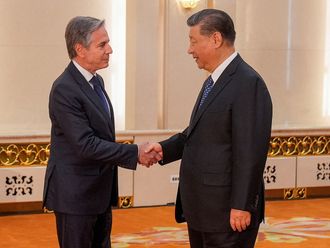Dhaka: Police has accused former prime minister Khaleda Zia of “masterminding” deadly arson attacks as violence left 34 people dead in the past 20 days since her Bangladesh Nationalist Party (BNP) launched a non-stop nationwide blockade.
“She [Khaleda] has been charged in a particular case of carrying out the arson attack on a bus with petrol bombs on Friday evening at Jatrabari area (in the capital),” a police officer familiar with the development told newsmen.
He added that Khaleda was named in the case as the hukumer ashami or accused of ordering the attack, one of the deadliest arson attacks in the current spate of violence as it wounded 29 people, nine of them critically.
Another official, who preferred anonymity, told Gulf News that the case was filed early yesterday but the disclosure came late night yesterday because of the death of Khaleda’s self-exiled younger son Arafat Rahman in Malaysia in the midday yesterday.
Prime Minister Shaikh Hasina earlier on January 21 hinted that her arch-rival Khaleda could be tried for instigating deadly violence saying, “It will be logical to bring her [Khaleda] under the purview of law as the accused of giving order of the killings”.
“But it is up to agencies enforcing the law to check this out and take necessary action” the premier told the parliament as her ruling Awami League lawmakers demanded legal actions against Khaleda.
The police headquarters meanwhile announced late yesterday a bounty of Taka 500,000 (Dh23,606) for specific information about the people who torched the bus at the Jatrabari hurling two petrol bombs.
The government earlier had announced Taka 100,000 as bounty for help in arresting the people involved in bomb attacks as part of an apparently desperate effort to mobilise peoples support in tracking down the arsonists or perpetrators of deadly clandestine attacks.
The development came as several analysts said Bangladesh’s volatile politics virtually exposed the major two parties to a “point of no return” after Hasina yesterday failed to meet her grieved arch-rival for consolation as she was declined entry to Khaleda’s office.
The incident sparked widespread controversies while Hasina’s media affairs adviser Iqbal Sobhan Chowdhury calling the BNP gesture “contrary to decency”.
Khaleda’s aides, however, said the ex-premier was “sleeping” while Hasina arrived as doctors administered her sedative injections to sooth her after she became sick receiving her son’s death.
The BNP chief’s press secretary Maruf Kamal Sohel in a late night briefing, however, said Khaleda thanked her arch-rival for her humane gesture by going to see her as she came to know about the visit after she woke up.
The TV footage showed Hasina arriving in front of Khaleda’s upmarket Gulshan office and getting off her car while the gate were locked from inside.
None of the BNP leaders or the BNP chief’s aides who were staying inside came to receive the premier as she waited for few minutes along with senior government ministers in front of the closed gate.
Strangely, Shaikh Hasina failed to meet Khaleda when her party was spearheading a desperate campaign for a dialogue with the government on a fresh midterm election.
BNP boycotted the last year’s divisive January 5, 2014 elections, boycotted by BNP over its dispute with Awami League on poll timings.
“The nation was expecting the meeting of the two leaders to create a scope to ease the political situation and end the deadly violence but the incident exposed the people to frustration,” said analyst Shyamol Datta while speaking at a talk show on 71 TV channel.
The two leaders last met and talked in 2009 when Khaleda visited a grieved Hasina after the death of her nuclear scientist husband Wazed Mia in 2009.
They, however, had a heated exchange over the phone in 2013 when Khaleda also rejected the arch-rivals invitation to a dinner for talks ahead of the divisive January 5, 2014 polls, eventually boycotted by BNP.
But BNP continued with its antigovernment campaign enforcing a fresh 36-hour nationwide strike from Sunday morning to coincide with the ongoing transport blockade that began January 6.
BNP’s senior standing committee member Rafiqul Islam Mia, meanwhile, told newsmen despite her personal grief after losing her son, Zia asked party men to continue with the previously called 36-hour shutdown alongside the blockade.
The campaign sparked nationwide violence that so far left 34 people dead; mostly in arson attacks carried out by suspected activists of BNP and its crucial ally fundamentalist Jamaat-e-Islami.
Forty five-year Koko died in cardiac arrest on his way to a hospital in Malaysia, where he was living for the past several years.












